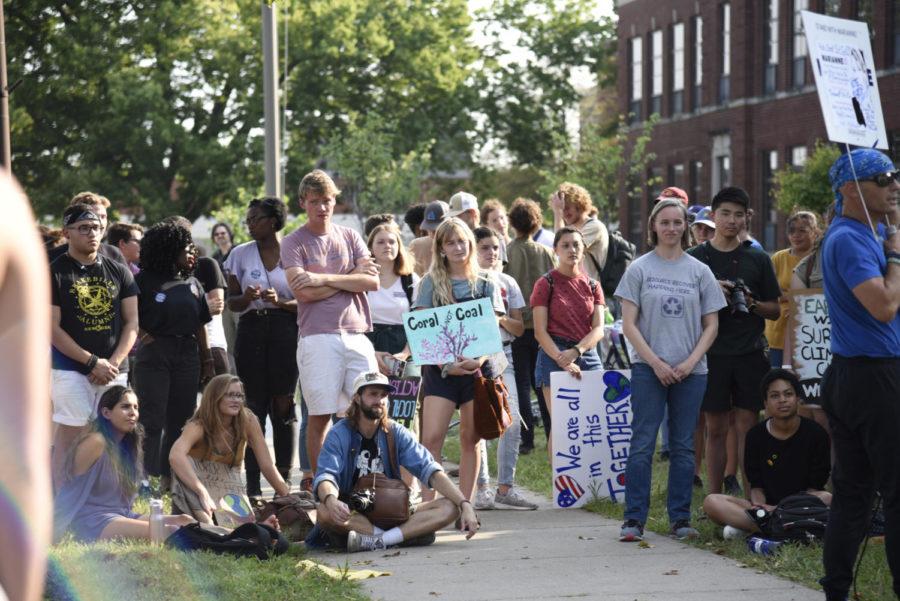- News
- News / Politics And Administration
- News / Politics And Administration / Campus
- News / Politics And Administration / City
- News / Politics And Administration / State
Young Americans see importance in climate crisis
Caitlin Yamada/ Iowa State Daily
A climate protest took place in Ames from 3 p.m. to 5 p.m. Sept. 20 at Ames City Hall. Different signs and speeches encouraged attendees to change habits to help the environment.
October 8, 2019
Climate strikes have been occurring around the world, following in the footsteps of Swedish teenager and climate activist Greta Thunberg.
Students have left schools, including in Iowa, and marched in the streets or other public areas to protest in an attempt to force governments to take action against the climate crisis.
Amy Smith, associate professor of political science, said the youngest generation will see these environmental issues affect their lives.
“A lot of the long term effects of climate change are likely going to be experienced by [that generation] in their lives,” Smith said.
A recent YouGov poll found 20 percent of Americans aged 18-29 said the environment is the most important political issue for them, more than any other issue. The next closest percentage is 12 percent for Americans aged 45 and higher.
Hector Arbuckle, senior in biology and communication chair of Campus Climate Reality Corps, said the younger generation is more prone to hearing about environmental issues.
“We have been growing up learning about the terrible things around us,” Arbuckle said.
Another contribution to the increased interest in this issue is the different movements around the world, and specifically Thunberg’s contribution to making people aware of the issue, Smith said.
“She has been sort of a role model,” Smith said. “She has been symbolically important.”
Iowa State is involved in this by teaching students and by certain campus environmental groups pushing for change.
Hearing of species going extinct due to environmental issues is “kind of depressing,” Arbuckle said. The ongoing number of species going extinct has been referred to as the Anthropocene extinction, which is extinction caused in an era dominated by human influence on the environment.
Gerardo Ceballos, a foreign associate member of the National Academy of Sciences, and Paul Ehrlich, president of the Center for Conservation Biology at Stanford University, wrote in Science Magazine on the issue.
“[T]he rate of species extinction is now as much as 100 times that of the ‘normal rate’ throughout geological time,” Ceballos and Ehrlich said in Science Magazine.
Iowa State understands the importance of climate change, but students should still be challenging authority figures and the Ames City Council, Smith said.
“Students can keep up the pressure against authority,” Smith said. “Students should definitely be pushing administration.”
Iowa State can do more, this is an important issue, Arbuckle said.
“This is an emergency,” Arbuckle said, “It’s life or death.”
Arbuckle said a huge reason efforts may not be happening is because of those that are in denial.
“It’s something we are all going to face,” Arbuckle said. “We have to start thinking about how to solve it.”
These effects can impact Iowans and Iowa State students, and if they care about agriculture they should look around, Smith said.
“Unusual rain patterns are affecting agriculture in Iowa,” Smith said.
Gov. Kim Reynolds has issued and extended disaster declarations for flooding following heavy rains in Iowa for several months in 2019, going back to March and most recently extending to Sept. 18.
Arbuckle said a way to combat this issue is by talking to others and being involved in the movements on campus.







